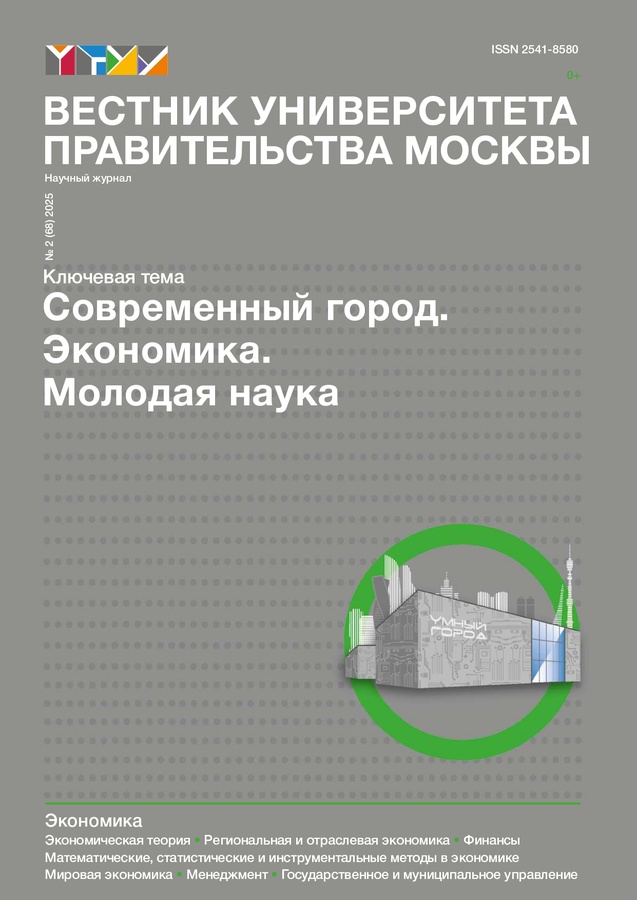Analysis of Intellectual Maturity Indicators within the Russian Education System
- Authors: Lanshchikova I.L.1
-
Affiliations:
- Moscow Metropolitan Governance Yury Luzhkov University
- Issue: No 2 (68) (2025): NO2 (68) (2025)
- Pages: 30-35
- Section: Articles
- URL: https://journal-vniispk.ru/2541-8580/article/view/326390
- ID: 326390
Cite item
Full Text
Abstract
About the authors
I. L. Lanshchikova
Moscow Metropolitan Governance Yury Luzhkov University
Email: Ishetneva@yandex.ru
1st year PhD student in Management Moscow
References
- Opportunities of the "Electronic Journal". the Mayor and the Government of Moscow Official Portal: [website]. Available at: https://school.mos.ru/help/instructions/journal/getting-started-teacher/featuresjournal/ (accessed: 20.02.2025). (In Russ.).
- Geography of the Presence of the Mesh Educational Platform in the Regions. Center for the Promotion of Mesh in the Regions: [website]. Available at: https://centrmes.educom.ru/ (accessed: 20.02.2025). (In Russ.).
- Gladilina I. P., Klimkovich E. V., Bondarenko A. S. The University Educational Space as a Factor of Transforming the Digital Society Ecosystem. Sovremennoye Pedagogicheskoye Obrazovaniye, 2024, no. 1, pp. 316-221. (In Russ.).
- Gladilina I. P., Sergeyeva S. A., Sinitsyna E. V. Digital Ethics and Data Ethics as a Basis for Rational Activity of Economic Entities in the Context of Digital Transformation. Ekonomicheskiye Sistemy, 2024, vol. 17, no. 4 (67), pp. 28-38. (In Russ.).
- Index of Readiness of Priority Sectors of the Economy of the Russian Federation to the Implementation of Artificial Intelligence. Analytical Report. Moscow: NCRII Publ., 2024. Available at: https://ai.gov.ru/upload/iblock/ded/lylk7r3ntjjjlg1qxruy3hf45i9uma6p.pdf (accessed: 02.03.2025). (In Russ.).
- Index of Intellectual Maturity of Economic Sectors, Sectors of the Social Sphere and the System of Public Administration of the Russian Federation: Analytical Report. Moscow: NCRII Publ., 2023. Available at: https://ai.gov.ru/knowledgebase/infrastrukturaii/2023_indeks_intellektualynoy_zrelosti_otrasley_ekonomiki_sektorov_socialynoy_sfery_i_sistemy_gosudarstvennogo_upravleniya_rossiyskoy_federacii_ncrii_pri_pravitelystve_rf/ (accessed: 18.05.2025). (In Russ.).
- List of Instructions Following the Results of the Conference "Journey Into the World of Artificial Intelligence". President of Russia: [website]. Available at: http://www.kremlin.ru/acts/assignments/orders/76076 (accessed: 02.03.2025). (In Russ.).
- The Government Will Conduct a Study of the Readiness For the Introduction of Artificial Intelligence Technologies in All 89 Regions of the Country. Ministry of Economic Development: [website]. 31.07.2023. Available at: https://www.economy.gov.ru/material/news/pravitelstvo_provedet_issledovanie_gotovnosti_vnedreniya_tehnologiy_iskusstvennogo_intellekta_vo_vseh_89_regionah_strany.html (accessed: 02.03.2025). (In Russ.).
- Decree of the Government of the Russian Federation of 21.12.2021 No. 3759-r "On Approval of the Strategic Direction in the Field of Digital Transformation of Science and Higher Education". Available at: LIS "ConsultantPlus" (accessed: 20.03.2025). (In Russ.).
- BCG. Digital Culture in School Education Prerequisite for Economy of Future. 7 p. URL: https://web-assets.bcg.com/da/a6/e04d2caa42a2befafec667c4a8cc/digital-culture-in-school-education-prerequisite-for-economy-of-future.pdf (accessed: 21.05.2025).
- CooperGibson Research, Department for Education. Education Technology: Exploring Digital Maturity in Schools. Research Report. March 2022. 2022. 114 p. [Government Social Research]. Available at: https://assets.publishing.service.gov.uk/government/uploads/system/uploads/attachment_data/file/1061797/Exploring_digital_maturity_in_schools.pdf (accessed: 02.02.2025).
Supplementary files









